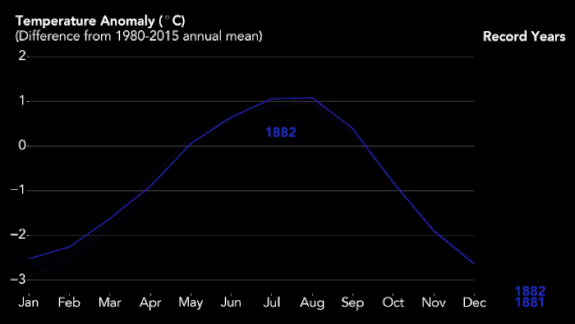EPA chief denies carbon dioxide is main cause of global warming and... wait, what!?

Well, that didn't take long.
Soon after moving to slash his agency's budget and staff, Scott Pruitt, the new head of the Environmental Protection Agency (EPA), said on Thursday that he doesn't believe that the human-caused buildup in atmospheric carbon dioxide concentrations is the primary contributor behind global warming.
These statements go beyond his previous expressions of doubt regarding mainstream climate science findings, and indicate that the person responsible for regulating carbon dioxide does not believe that this pollutant is much of a problem after all.
SEE ALSO: A man with a nasty habit of suing the EPA now leads it, because why not?
In an interview with CNBC's "Squawk Box," Pruitt said: "I think that measuring with precision human activity on the climate is something very challenging to do and there's tremendous disagreement about the degree of impact, so no, I would not agree that it's a primary contributor to the global warming that we see."
"But we don't know that yet, as far as... we need to continue the debate and continue the review and the analysis," he said.
The question CNBC asked Pruitt was: "Do you believe that it's been proven that [carbon dioxide] is the primary control knob for climate? Do you believe that?"
Pruitt's comments put him at odds with the conclusions of his own agency's climate scientists, who have found that carbon dioxide emissions endanger public health and welfare.

Image: nasa giss
They also run counter to the findings of climate scientists around the world, who have found that the burning of fossil fuels such as coal, oil and natural gas has vaulted the level of carbon dioxide in the Earth's atmosphere to the highest levels in all of human history, and likely longer than that.
This rise has driven an increase in the planet's surface temperature, studies show, with projections of this connection between carbon emissions and temperature trends dating back to the 18th century.
Carbon dioxide levels are now above 400 parts per million (ppm), up from the preindustrial level of about 280 ppm.
Uh, yes it is. https://t.co/19refPKyWH
— Senator Chris Coons (@ChrisCoons) March 9, 2017
According to the U.N. Intergovernmental Panel on Climate Change (IPCC), the increase in atmospheric carbon dioxide concentrations has contributed the most to global warming since 1750, when accounting for other greenhouse gases and natural factors that influence the climate, such as volcanoes and solar variability.
"The planet's average surface temperature has risen about 2.0 degrees Fahrenheit (1.1 degrees Celsius) since the late 19th century, a change driven largely by increased carbon dioxide and other human-made emissions into the atmosphere," NASA and NOAA said in a joint press release in January. Last year was the warmest on record since 1880, beating out 2015 for the title.
In addition, the release of other planet-warming gases such as methane is also increasing, boosting global average temperatures even more and causing certain weather extremes to become more frequent, severe and longer-lasting, among other ill-effects.
This is just nuts: EPA chief Scott Pruitt just claimed carbon not causing climate change. We Senate D's will be a check on his crazy views.
— Brian Schatz (@brianschatz) March 9, 2017
“We know that global warming is happening, and that the climate is changing," said Noah Diffenbough, a climate researcher at Stanford University, in a statement.
"It’s clear that humans are the primary cause. It’s clear that we are already being impacted by climate change here in the United States. To deny that reality not only is a denial of scientific evidence but it also threatens the safety and security of Americans who face increasing odds of extreme events like the California drought, the flooding from Superstorm Sandy, and the heat wave that decimated crops in the mid-west in 2012," Diffenbough said.
While there is debate within the scientific community about the specific impacts of global warming, there is virtually no controversy over why the world is warming in the first place and carbon dioxide’s leading role in causing it.
Nevertheless, Pruitt is already using his new position to begin rolling back regulations seeking to limit greenhouse gas emissions. For example, he has stalled the process of formulating methane regulations that would have placed limits on emissions of this powerful, short-lived greenhouse gas from the oil and gas industry.
Pruitt's statements on Thursday go further than what he told a Senate committee in January, when he made clear he was not yet convinced that human activities were to blame for global warming, though he told senators he disagreed with President Donald Trump, who has called global warming a "hoax."
Pruitt also told the Senate that the EPA has a "a very important role to perform in regulating CO2," referring to carbon dioxide by its chemical composition.
In response to Pruitt's statement, Jamie Henn of the climate activist group 350.org said he was flat-out lying.
"This is like your doctor telling you that cigarettes don't cause cancer," Henn said in a statement. "Pruitt’s statement isn’t just inaccurate, it’s a lie. He knows CO2 is the leading cause of climate change, but is misleading the public in order to protect the fossil fuel industry."
WATCH: NASA timelapse shows just how quickly our Arctic sea ice is disappearing
